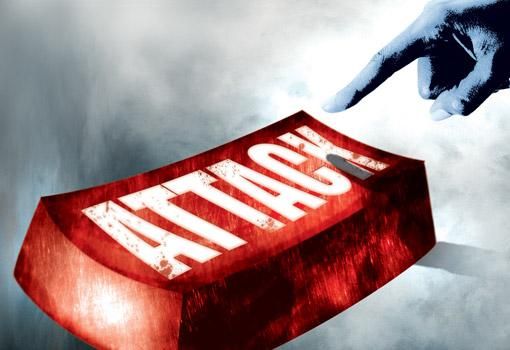Stop me if you heard this one before: a pre-emptive strike on Iran's presumptive nuclear sites by the United States, or by its dogs of war in Israel, will be a disaster for our entire region, for the world economy and for international security as a whole.
To be sure, the odds of an American attack began to diminish last December after the National Intelligence Estimate, the combined reports of several different intelligence agencies, concluded that Iran had halted its weapons programme in 2003. Though President George W. Bush continued to question the significance of the NIE findings, and to emphasise that "urgent action" was necessary to counter the "Iranian nuclear threat", the administration appeared to come to terms with its own intelligence agencies' conclusions. Moreover, senior officials in the Pentagon have let Congress know that they are dubious about whether a military strike is the right solution.
According to several media reports, Secretary of Defence Robert Gates met last year with Democratic senators on the Hill (Congress has been under Democratic control since the 2006 elections) and warned them bluntly about the apocalyptic consequences of bombing Iran. "We'll create generations of jihadists," he reportedly told the legislators, "and our grandchildren will be battling our enemies here in America".
For now, the US has confined itself to a Congressionally-approved escalation of covert operations, for which the administration has received $400 million in funding, aimed at destabilising the country's leadership, and gathering intelligence on its alleged nuclear weapons. While Washington's threat to attack Iran may have subsided, speculation has mounted that Israel is preparing to do the job itself - speculation given further credence by its recent military manoeuvres in the Mediterranean, which have been seen as evident target practice for an Iran attack, possibly before November's US presidential election.
American acquiescence
Would Israel be foolish enough to risk a wider war and dash all Western hopes of stabilising Afghanistan and Iraq? For make no mistake about it, Arabs and other Muslims would rightly hold the US responsible for such an act of aggression. Clearly, Israel would have sought and received the green light from Washington before it set out on such an ill-conceived adventure, if for no reason other than the fact that Tel Aviv would need American acquiescence to fly its fighter jets over US-controlled Iraq, the most logical route to Iranian airspace. The dire consequences of such brazenness by Israel have not gone unnoticed by commentators and officials alike in Europe and the US.
Anatole Lieven, professor at King's College, London, writing in the Financial Times last week, as a "friend of Afghanistan" and as someone concerned about the safety of British troops there, spoke of "one blindingly obvious fact: that a US-backed attack on Iran will doom our enterprise in Afghanistan to irretrievable failure. From the moment that Israeli munitions fall on Iran, all hope of stabilising Afghanistan on Western terms will be lost. From then on, every British soldier who dies in Afghanistan will die for nothing".
Even the Chairman of the US Joint Chiefs of Staff, Admiral Michael Mullen, warned on July 2 that an Israeli strike could open a "third front" for the US in addition to the conflicts in Iraq and Afghanistan, telling reporters that from the US perspective, "opening a third front right now would be extremely stressful on us".
Of course, it may, just may, be possible that the US, using its Israeli proxy in the region, is playing one of those high-risk, high-stakes poker games to intimidate Iran: accept the international offer on the table and give up your nuclear programme, or we shall unleash the dogs of war, those Israeli crazies, on you. (After all, it will be recalled, it was administration officials who first leaked news of the Israeli military manoeuvres.) But that, as any poker player will tell you, is a dangerous game. Iranians are not known, in a confrontation, to fall for a bluff or be the first to blink.
Still, let's not be lulled into thinking that plans for a strike by the US itself have been entirely shelved by the current administration, or will be shelved by a future one headed by a new president. The US negotiating position remains the same: talks will not be held until Iranians halted their uranium enrichment programme (Tehran contends that its enrichment programme is for civilian purposes and thus allowed under the Nuclear Non-Proliferation Treaty). And Barack Obama, projected to win the presidency in November, has repeated his position, at the annual conference of the American Israel Public Affairs Committee in June, that he would pursue "tough and principled diplomacy", but he would keep the threat of a military assault on the table.
Deadly serious game of brinkmanship indeed.
Meanwhile, nary a word in the American media, which had uncritically greased the skids to the invasion of Iraq five years ago, about how Israel's refusal to sign the Non-Proliferation Treaty and its possession of a large arsenal of nuclear arms should be relevant as context in discussing Iran's putative nuclear capability. The thrust of the public debate there is that Israel's nuclear weapons are for self-defence in the hostile environment it occupies in the Middle East, but Iran, threatened by both Israel and Israel's superpower patron, does not have that right. Don't scratch your head, that's the American media for you.
Fawaz Turki is a veteran journalist, lecturer and author of several books, including The Disinherited: Journal of a Palestinian Exile. He lives in Washington D.C.











